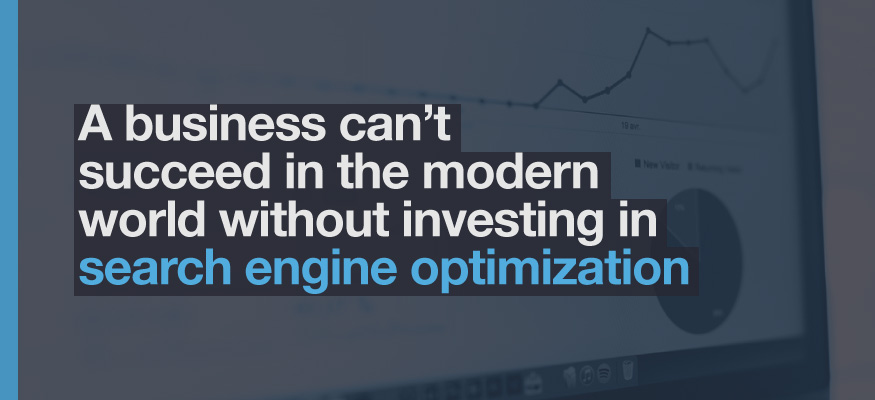- What Search Engine Optimization is.
- The principles of SEO.
- Why SEO is important for all businesses.
- How to apply the principles of SEO to brick & mortar businesses.
- How to measure SEO success.
Search Engine Optimization: The process of improving the quality and quantity of website traffic to a website from search engines (such as Google). Most often used to increase engagement with the website or business's services.
As famed management consultant, educator, and author Peter Drucker said, “There are only two things in a business that make money – innovation and marketing, everything else is cost.” And when it comes to marketing in the modern world, search engine optimization (SEO) is one of the most profitable, highest-ROI marketing channels that exist.
“There aren't any other channels that come close to the ROI that SEO can bring to an organization long term,” explains Vlad Rascanu, Director of Growth at Acquira.

In the past, Vlad served as SEO Lead at Expedia. Expedia is one of the most well-known travel agency websites in the world. It’s a giant company. In Vlad’s time there, 80 percent of the company’s profits were coming from three channels: brand, email marketing, and SEO.
In his time there, he more than doubled Expedia Canada’s SEO channel in two years, an accomplishment that no one was able to predict. “(That) was pretty sensational for everybody in the company,” he explained. “That was the biggest ‘wow!’ moment of my career.”
Now Vlad works at Acquira, sharing his SEO and marketing expertise with our partners.
Online Marketing Is The Future

Years before his time in the SEO world, Vlad worked as a business analyst for a small telecom company. The telco was only concentrating on offline marketing. When Vlad looked at their numbers, he noticed that their marketing costs were stagnant or climbing over a period of 3 to 5 years. Despite that, revenue numbers were gradually decreasing each year.
That’s when he knew that the future of marketing was online. He dove into the world of SEO and Google Ads, teaching himself in his spare time. Eventually, he took a job with an agency to speed up his learning and get hands-on experience.
One of the first clients Vlad had was a garage door repairman in Florida. The owner was running out of marketing options and close to shutting down. His investment in SEO was a last-ditch effort to save his business and his home.
With such a short time to turn his business around, Vlad had to move fast. Within a few weeks, they began to see small wins. After three months, his business was ranking on the first page of Google for many relevant keywords.
“After three months of working with this business owner, he called me in tears, telling me how thankful he was that he found us and that we saved his business and his home,” says Vlad. “That's when I realized the impact I could have on businesses and on business owners with SEO. Needless to say, from that point on, I gave it my all to become one of the best SEOs in the world so I can help more people in the same way.”
A Brief History of Search Engine Optimization
SEO has been around since the early days of the internet, starting with the first website in 1991 and the first search engine in 1993.
As blogger Nick Schäferhoff points out, for many people, SEO officially began in 1997 and can trace its roots back to the classic rock band Jefferson Starship. According to the story, the band’s manager Bill Thompson became upset when he saw that the official Jefferson Starship website was ranking on Page 4 of an unspecified search engine.
Apparently, this deeply upset Thompson. As a result, the company responsible for the band’s website began to focus on search engine ranking. By using the band’s name a few more times on the page, they were able to raise their position. And thus, the field of SEO was born.
The veracity of this story is up for debate. But it does illustrate the fact that, in the beginning, search engine optimization was relegated to the digital realm. Traditional brick and mortar companies, with their traditional marketing plans and advertising budgets, ignored SEO for years.
But as Vlad’s story illustrates, the future lies in digital marketing. And sooner or later, these brick and mortar businesses will need to embrace the technology. We’re betting on “sooner.”
There are a number of search engines out there, but Google is the king of that particular digital hill. In fact, Google handles 80 percent of global search queries. After that is the Chinese search engine Baidu at 11 percent, and then Bing with five percent.
Thanks to the sheer amount of traffic the site receives, when the experts look at how to optimize search engine results, they’re concentrating all of their attention on Google.
The Principles of SEO Planning
Fortunately, the principles for digital businesses and real-world businesses are identical.
Google's search algorithm ranks web pages based on four categories of signals.
- Technical
This looks at how visitors engage with the website from a technical standpoint. If a website has an HTTPS certificate, it signals to Google that the website is genuine, the connection is secure, the data encrypted. It also looks at how quickly the website is loading for users and other technical elements related to hosting servers, the website code, etc.
Google wants to ensure that the user experience is of a high enough caliber and that the information presented on each site is credible.
- Content
Google has invented many algorithms to interpret content and measure topical relevance and user identities targeted. It can even check for different personas, which analyzes whether the content is trying to appeal to different types of personalities.
It will also analyze whether multimedia is being used to support the education of a user. If, for example, you have a website that shares recipes, it’s almost mandatory to have a video of some sort on that page, explains Vlad. Google understands that most people who are looking for recipes want to see a video explaining how the recipe is made, so it will rank those pages higher.
Essentially, Google has many variables it uses to judge content before deciding where to rank a page on its SERP (Search Engine Results Page) for various keywords.
At its most basic, SERP is simply all of the website links in blue that appear when you search anything in Google.
- Offsite Signals
This includes a number of external signals such as links or mentions on third-party sites. Google will scroll other sites, looking for mentions of your brand.
- User Behavior
This final category measures how people interact with your website whenever it shows up in the SERPs and with your website. For example, if a web page is ranking third for the keyword “best plumbers in Chicago,” Google will look for positive interactions with the site
If people click on the first link, then return to Google, then click on the second link and return to Google again, but click on the third link and don’t return to Google, this is a positive interaction. Google will assume that the content found at the third link satisfied the search query and, over time, will move this page higher in rankings if similar behavior is noticed with other users as well. It’s a sign of an authoritative website for that keyword.
Google tracks the click-through rates and bounce rates (the amount of time someone is on a page before they leave) of your web page for specific search queries.
Hear Vlad break down how he thinks about these principles:
Bringing SEO to Brick and Mortar
As we said, the SEO principles for digital businesses and traditional brick and mortar locations are identical.
There are, however, a few additional things that traditional retailers and service providers should consider.

For example, local SEO is a big consideration for companies with a physical address. Local SEO boosts Google Maps visibility for businesses. If you have a physical location, then you absolutely must do Local SEO.
When we talk about “local SEO,” that means we’re optimizing a particular website’s business to target a specific geographic area. You can see what we mean right now if you just open up Google and type in “HVAC.” More than likely, you’ll see recommendations for HVAC service companies in your area. This is local SEO.
Acquira has experienced success with local SEO in the past.
We bought Plumb-Tech in September 2020. Almost immediately after revamping its online presence, we saw great improvements in traffic and appointment bookings.
An essential factor of that revamp was implementing a robust SEO strategy. Our research at the time revealed that Plumb-Tech’s competitors were not implementing their own SEO plans, and by executing our own we were able to raise the company’s profile substantially.
When we acquired American Home Water and Air (AHWA) we implemented a similar strategy and saw similar results.
The simple truth is, SEO works.
The Importance Of An SEO Plan
We’ve discussed ROI at length. And for any business, return on investment is a cornerstone KPI that should dictate what marketing channels a business should use.
However, there is another reason that SEO is important, and that has to do with human behavior.
It’s well known that Google also offers advertising options for businesses. This feature allows companies to pay a certain amount in order to appear at the top of a results page. Still, only about 25 percent of people will click on those ads, according to Vlad. The rest usually opt to click on the organic links.
Without a strong SEO strategy, businesses will miss out on potential customers searching for their products or services on Google. “And they're just not going to find you if you're not on the first page of Google for those products or services,” says Vlad.
Measuring SEO Success

There are a number of ways to measure the efficacy of an SEO campaign but the simple fact is that a business can’t succeed in the modern world without investing in search engine optimization.
Even with an SEO plan, it’s important to remember that results will take time. Acquira has seen results as early as one month after implementing an effective SEO campaign. However, these types of outcomes are generally found in smaller markets. It can take between six and twelve months before you start seeing noticeable results in larger markets, explains Vlad.
“It really depends on a lot of variables,” says Vlad. “But I would say that you should be prepared, no matter what industry or what location you're in, to wait four to six months before you start seeing any kind of result from SEO.”
As the world wide web has entered itself into every facet of our lives, an SEO marketing strategy has become indispensable. It doesn’t matter whether you’re a dropshipper in India or a plumber in Kansas, if you want your business to grow, then SEO is absolutely necessary.
It’s also a constantly changing discipline. Major changes aren’t uncommon multiple times each year and it can be difficult to keep up. Twelve years after he started, Vlad still reads about what’s happening in the SEO world every day.
Looking to the future, Google will continue to gradually rely more and more on user data to rank websites. To succeed, SEO experts will need to understand their users better and deliver a remarkable brand and web experience. Robust strategies for SEO are one of the most powerful tools a company has for realizing growth.
After all, excellent outcomes are born from strong systems. By implementing a thoughtful, purposeful SEO marketing system, there is no doubt that you will be able to grow your business. It’s what we like to think of as systematic excellence.
At Acquira, we provide coaching and consulting services for any new owners who we partner with. We also have relationships with several SEO vendors who have been vetted and who we’ve experienced success with.
If you’re interested in implementing an effective SEO strategy for a newly acquired company, we recommend checking out our Acceleration Program. You’ll be given access to all of our resources as well as our diverse community of entrepreneurs.
Have you had any success stories with an effective SEO strategy? Let us know in the comments. And if you know anyone who’s trying to develop an SEO strategy themselves, feel free to share this article with them.
Key Takeaways
- If your business isn’t on the first page of Google, it may as well not exist.
- SEO has one of the best Return On Investment in marketing.
- SEO isn’t just for digital businesses, brick and mortar companies should use it as well.
- An effective strategy for SEO takes time but is necessary for business growth.
Acquira specializes in seamless business succession and acquisition. We guide entrepreneurs in acquiring businesses and investing in their growth and success. Our focus is on creating a lasting, positive impact for owners, employees, and the community through each transition.



